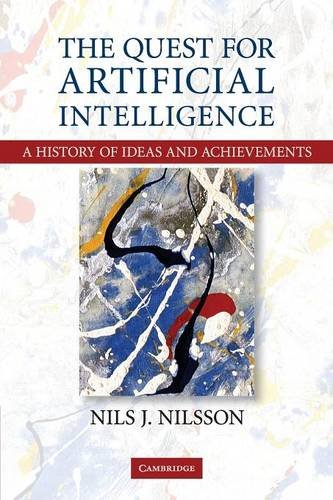Nils J. Nilsson: The Quest for Artificial Intelligence: A History of Ideas and Achievements (2009)
Filed under book | Tags: · artificial intelligence, computation, computing, history of science, machine learning, neural networks, robotics

“This book traces the history of artificial intelligence, from the early dreams of eighteenth-century (and earlier) pioneers to the more successful work of today’s AI engineers. The book includes many diagrams and easy-to-understand descriptions of AI programs that will help the casual reader gain an understanding of how these and other AI systems actually work.”
Self-published 2009 (web version)
Publisher Cambridge University Press, 2009 (print version)
Open access (web version)
ISBN 9780521116398, 0521116392 (print version)
707 pages
Review: Peter Norvig (Artificial Intelligence, 2010).
PDF (15 MB)
Comment (0)Matthew G. Kirschenbaum: Track Changes: A Literary History of Word Processing (2016)
Filed under book | Tags: · computation, digital humanities, history of literature, history of technology, literary theory, materiality, media archeology, media theory, technology, word processing, writing

“The story of writing in the digital age is every bit as messy as the ink-stained rags that littered the floor of Gutenberg’s print shop or the hot molten lead of the Linotype machine. During the period of the pivotal growth and widespread adoption of word processing as a writing technology, some authors embraced it as a marvel while others decried it as the death of literature. The product of years of archival research and numerous interviews conducted by the author, Track Changes is the first literary history of word processing.
Matthew Kirschenbaum examines how the interests and ideals of creative authorship came to coexist with the computer revolution. Who were the first adopters? What kind of anxieties did they share? Was word processing perceived as just a better typewriter or something more? How did it change our understanding of writing?
Track Changes balances the stories of individual writers with a consideration of how the seemingly ineffable act of writing is always grounded in particular instruments and media, from quills to keyboards. Along the way, we discover the candidates for the first novel written on a word processor, explore the surprisingly varied reasons why writers of both popular and serious literature adopted the technology, trace the spread of new metaphors and ideas from word processing in fiction and poetry, and consider the fate of literary scholarship and memory in an era when the final remnants of authorship may consist of folders on a hard drive or documents in the cloud.”
Publisher Belknap Press of Harvard University Press, 2016
ISBN 9780674417076, 0674417070
xvi+344+[16] pages
via slowrotation
Reviews: Brian Dillon (The Guardian, 2016), Jessica Pressman (ALH Online Reviews, 2016), Eric Banks (Bookforum, 2016), Dylan Hicks (LA Review of Books, 2016), Kirkus Reviews (2016), Francis Russell (Hong Kong Review of Books, 2016), A. Bowdoin Van Riper (PopMatters, 2016), Leann Davis Alspaugh (Hedgehog Review, 2016), Thomas Padilla (American Archivist, 2017), Lai-Tze Fan (Papers of The Bibliographical Society of Canada, 2017), Seth Erickson (Interactions, 2017), David Walden (TUGboat, 2017), Grant Wythoff (Revista Hispánica Moderna, 2018), Elena Spadini (Umanistica Digitale, 2018).
Online companion
Publisher
WorldCat
D. Fox Harrell: Phantasmal Media: An Approach to Imagination, Computation, and Expression (2013)
Filed under book | Tags: · agency, artificial intelligence, cognition, computation, computing, epistemology, ethnicity, imagination, interface, meaning, media, metaphor, narrative, new media art, poetics, power, race, self, semiotics, subjectivity, technology, theory, video games

“An argument that great expressive power of computational media arises from the construction of phantasms—blends of cultural ideas and sensory imagination.
In Phantasmal Media, D. Fox Harrell considers the expressive power of computational media. He argues, forcefully and persuasively, that the great expressive potential of computational media comes from the ability to construct and reveal phantasms—blends of cultural ideas and sensory imagination. These ubiquitous and often-unseen phantasms—cognitive phenomena that include sense of self, metaphors, social categories, narrative, and poetic thinking—influence almost all our everyday experiences. Harrell offers an approach for understanding and designing computational systems that have the power to evoke these phantasms, paying special attention to the exposure of oppressive phantasms and the creation of empowering ones. He argues for the importance of cultural content, diverse worldviews, and social values in computing. The expressive power of phantasms is not purely aesthetic, he contends; phantasmal media can express and construct the types of meaning central to the human condition.
Harrell discusses, among other topics, the phantasm as an orienting perspective for developers; expressive epistemologies, or data structures based on subjective human worldviews; morphic semiotics (building on the computer scientist Joseph Goguen’s theory of algebraic semiotics); cultural phantasms that influence consensus and reveal other perspectives; computing systems based on cultural models; interaction and expression; and the ways that real-world information is mapped onto, and instantiated by, computational data structures.
The concept of phantasmal media, Harrell argues, offers new possibilities for using the computer to understand and improve the human condition through the human capacity to imagine.”
Publisher MIT Press, 2013
ISBN 9780262019330, 0262019337
xix+420 pages
Reviews: John Harwood (Artforum, 2014), Brian Reffin Smith (Leonardo, 2015).
Comment (0)
